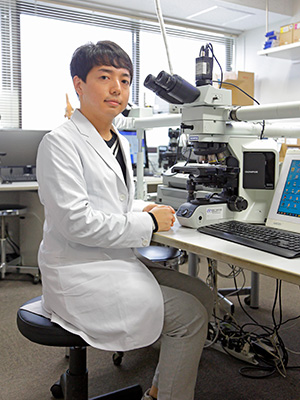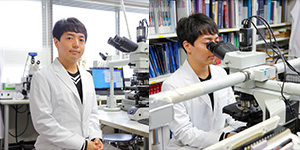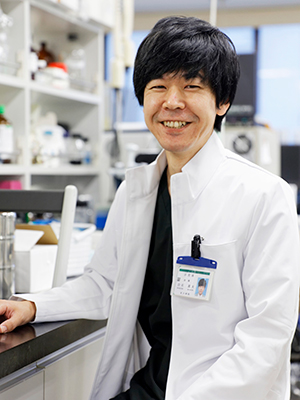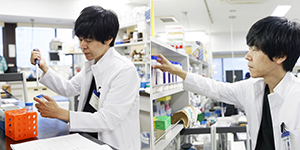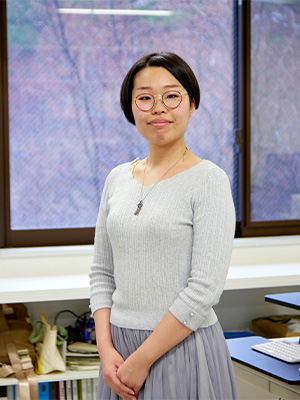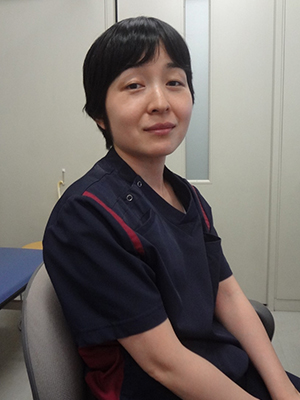
-
School of Medicine
-
Educational Content
-
Prospective Students
-
Current Students and Alumni
International Affairs

-
Graduate School of Medicine
-
Educational Content
-
Prospective Students
-
International Affairs

-
Graduate School of Biomedical Science and Engineering
-
Educational Content
-
Prospective Students
-
Other

-
Faculty of Medicine
-
Organizational Structure
-
Industry-academia Cooperative Projects

-
Overview
-
Entrance Examinations
-
Publications and Promotional Material
-
Various Types of Data
Doctoral Program
The 3 courses in the Doctoral Program are outlined as follows.
- HOME
- Graduate School of Medicine
- Doctoral Program
Doctoral Program
Course Outline
Based on the “Educational Goals” of the Graduate School of Medicine, the Doctoral Program aims to train students to be specialists like: (i) international recognized researchers in universities or research institutions worldwide, (ii) clinicians and medical scientists in medical institutions excelling in clinical techniques and research competence, and (iii) highly specialized professionals engaged in health services administration and public health in administrative organizations and companies, fully equipped with advanced knowledge and skills to play active roles in their respective fields.
We offer an interdisciplinary education crossing the boundaries of existing academic disciplines, aiming at the acquisition of basic knowledge and technology of mutually related fields. In addition, to nurture talented individuals responding to the diversified social needs, we introduce three types of coursework to study systematically through multiple subjects. Students choose the course that is best suited to their career needs.
Basic Medicine Course
This course aims to train researchers and educators in medical and life science field. Students acquire broad expertise required to become independent researchers, learn various research approaches including techniques for designing experiments, and develop their research capabilities. They are also expected to acquire the competence and skills to apply and utilize their expertise to medical and life science fields with interdisciplinary approach.
Message from Graduate Student
Clinical Medicine Course
This course aims to train clinicians who excel in clinical techniques and research competence. Rather
than relying solely on the traditional research methods of basic medicine using model animals or
cells, students gain the competence
they need for research in clinical medicine by applying methods targeting human.
A system of
Clinical Collaborative Departments is implemented for the students taking Clinical Medicine Course.
Under this system, students can collect
clinical data which may not be available at the university hospital, and can receive medical
research instructions from institutions where advanced and specialized diagnoses, examinations and
treatments are conducted which may
not be feasible at the university hospital. This system combines theory with practice in education
provided by multiple instructors including dedicated instructors and collaborative leading
clinicians.
Clinical Collaborative Departments
A system of clinical collaborative departments was implemented to promote highly advanced clinical medicine research, and it was designed for Doctoral Program students who choose the Clinical Medicine Course. It aims at training students to be excellent clinicians with impeccable clinical skills and research acumen. Under this system, students can receive research instruction from leading clinicians of unique medical institutions where advanced, specialized diagnoses, examination and treatments are conducted and patients' data are collected, information which may not be readily available at the university hospital. Furthermore, full-time faculty members also provide consummate theoretical and practical education.
Message from Graduate Student
Social Medicine Course
This course aims to train professionals who undertake the task of improvement of health and safety at the regional and international levels. Students start by learning research methods in social sciences including research ethics, basic and applied statistics, medical informatics and EBM (evidence-based medicine). This course emphasizes social medicine and preventive medicine, rather than biology and life science. Students aim at mastering the research approaches and skills that are necessary for research in public health and preventive medicine.
Message from Graduate Student
Obtainable degrees
Doctor of Philosophy
Standard Duration for Completion: 4 Years
- Short-Term Completion:
- A doctoral student who publishes at least 2 basic research papers in English-language journals as the first author and who meets other requirements can complete the Doctoral Program as much as 1 year before the end of the course term.
- Long-Term Study Program:
- Working students may take up to 6 years, paying tuition for 4 years.

Long-Term Study Program
1. Purpose
The standard term is 4 years. Long-Term Study Program (longer than four years) is offered for those who wish to study and acquire a degree through a long-term enrollment due to time limitations. Applicants are individually screened for eligibility.
2. Eligibility
Those who have difficulties in completing the program within the standard term due to personal reasons such as (1) full time jobs, (2) part time jobs (3) child-raising or a long-term nursing care, or (4) visual disabilities, auditory disabilities, physical disabilities or other disabilities are eligible to apply for this program.
3. Period of Enrollment
Students in Doctoral program may extend their term of study up to six years, and extension of study term can be applied the year as a unit. Students in a Long-Term Study Program are allowed to have four years leave as well as regular students.
4. Application Procedure
- (1) Application Period
- Please request at the time of application for admission. Application form is available at Student Affairs Office of the Graduate School of Medicine.
- (2) Application Documents
- Please submit the following documents to Student Affairs Office of the Graduate School of Medicine.
- i) Application for the long-term study Program (Form 1-1)
- ii) Reasons to apply to the Long-Term Study Program (Form 2)
- iii) Study plan of the long-Term Study Program (Form 3)
- iv) Documents to prove the need for the Long-Term Study Program
5. Shortening or re-extension of Long-Term Study Program
When deemed necessary by the Graduate School of Medicine, study term of Long-Term Study Program could be either shortened or re-extended once during the program.
Please contact Student Affairs Office of the Graduate School of Medicine for further information
6. Tuition Fees *
Annual tuition fee of the Long-Term Study Program is determined by dividing the total fees of the regular program of standard term (annual fee × 2 years) by the number of years allowed for the Long-Term Study Program. Tuition fee is non-refundable, and the tuition already been paid will not be adjusted.
* Please do NOT pay tuition fee of the Long-Term Study Program before receiving a notice of determination.
Interim Evaluation
Students have to undergo an interim evaluation at the beginning of the 3rd year, where examiners will check the progress of the work.
Completion Requirements
- ① Submission of a degree thesis (Dissertation).
- ② One main research paper accepted or published in an English-language journal with impact factor (the applicant must be the first author).
- ③ Completion of the required number of credits (30 or more credits).
Doctoral Program Completion Plan
(As of April 2025)
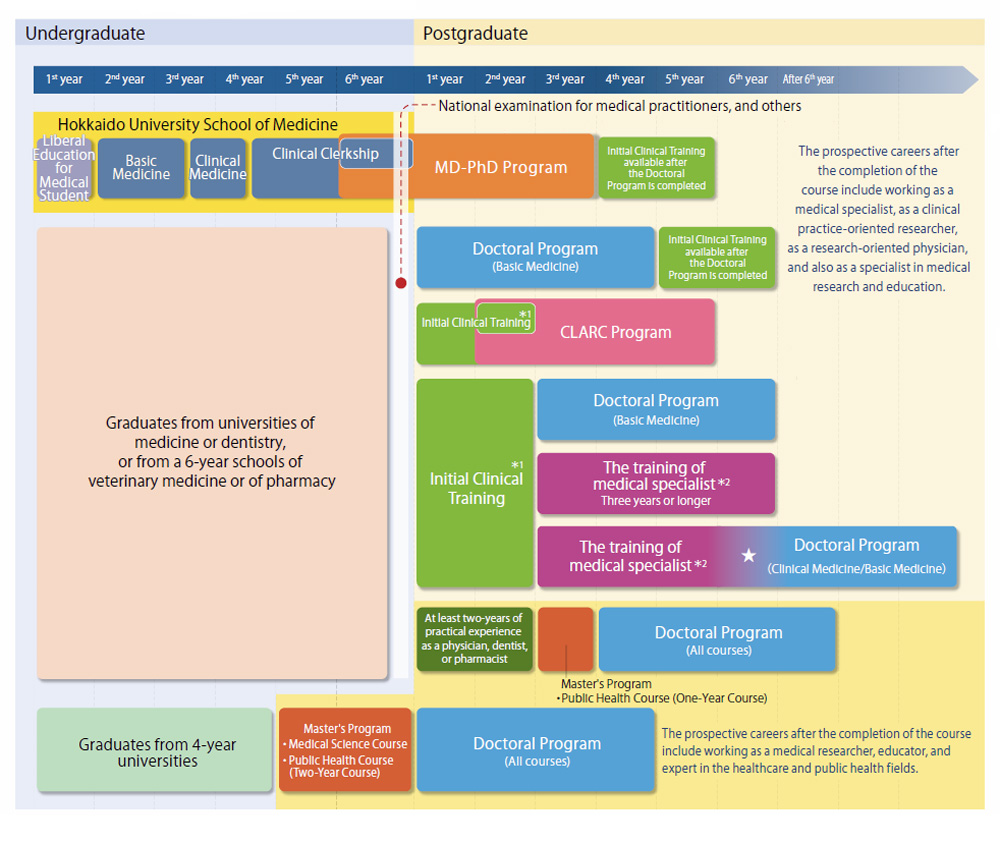
- *1 Students are not allowed to engage in medical practice related work unless they have completed Initial Clinical Training (Article 16 of the Medical Practitioners Act).
- *2 Example of the training of medical specialist under the new medical specialist system (started in April 2018)
The period and details of training vary depending on the training program of medical specialist established for each of the basic fields (19 fields including internal medicine and surgery). Those wishing to be medical specialists are required to complete the training of medical specialist.
★ Example of doctoral program started in the final year of the training of medical specialist
Career Options
Career Options after Completion of the Doctoral Program
(2007-2023 FY, total number of students who completed the program: 1,283)
More than half of the students completing the Doctoral Program work as medical doctors or medical experts at general hospitals or at university hospitals. The second largest career sector is as researchers at universities and companies.
(As of May 2025)
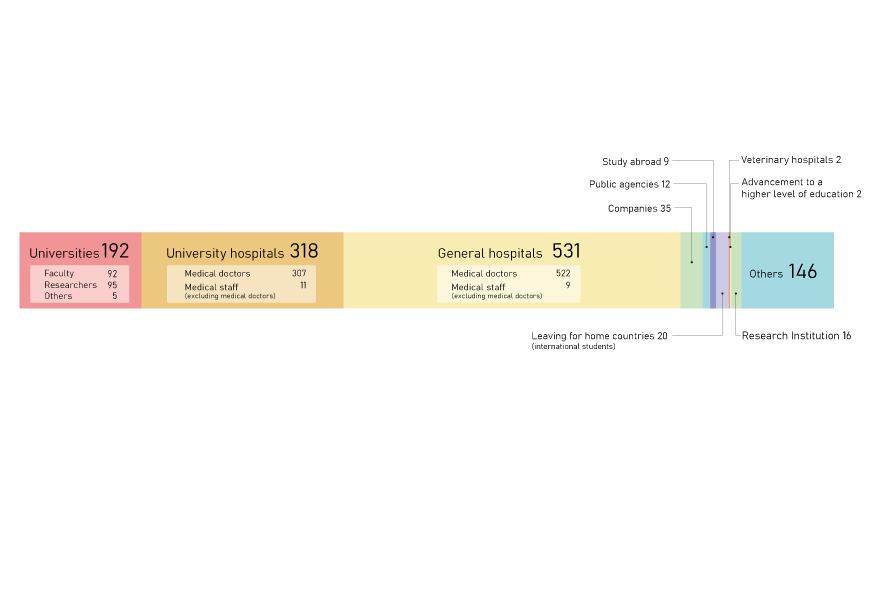
Message from a Graduate of the Doctoral Program
Course Guidance
The following 3 subjects are offered in the Doctoral (PhD) Program in Medicine.
Required Core Subjects
| Subjects | Subject | Credit |
|---|---|---|
| Basic Medicine Course Clinical Medicine Course Social Medicine Course |
Introduction to Medical Research | 1 |
| Experimental Methods and Research Designs | 1 | |
| Medical Ethics | 1 | |
| Scientific Presentation and Communication | 1 | |
| Presentation Skills I | 1 | |
| Presentation Skills II | 2 | |
| Introduction to Translational Research | 1 |
Required Subjects
| Subjects | Subjects | Credit |
|---|---|---|
| Basic Medicine Course | Research Methods in Medical Sciences I | 1 |
| Research Methods in Medical Sciences II | 1 | |
| Dissertation Research in Medical Sciences | 10 | |
| Clinical Medicine Course | Research Methods in Clinical Medical I | 1 |
| Research Methods in Clinical Medicine II | 1 | |
| Dissertation Research in Clinical Medicine | 10 | |
| Social Medicine Course | Research Methods in Social Medicine I | 1 |
| Research Methods in Social Medicine II | 1 | |
| Dissertation Research in Social Medicine | 10 |
Take one of these 3 courses and enroll all the subjects offered by that course.
Elective Subjects
| Subject | Subject | Credit |
|---|---|---|
| Basic Medicine Course Clinical Medicine Course Social Medicine Course |
Required Subjects from Other Courses |
Take 10 credits or more including 2 credits of Principles of Medicine offered by belonging laboratory.
*As for the subject which credit number is indicated as [number], students can take multiple choices as far as the chosen subjects belong to different subject titles.


